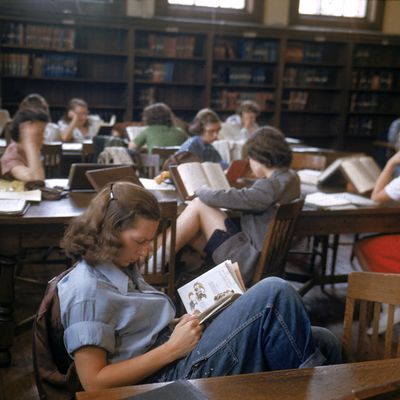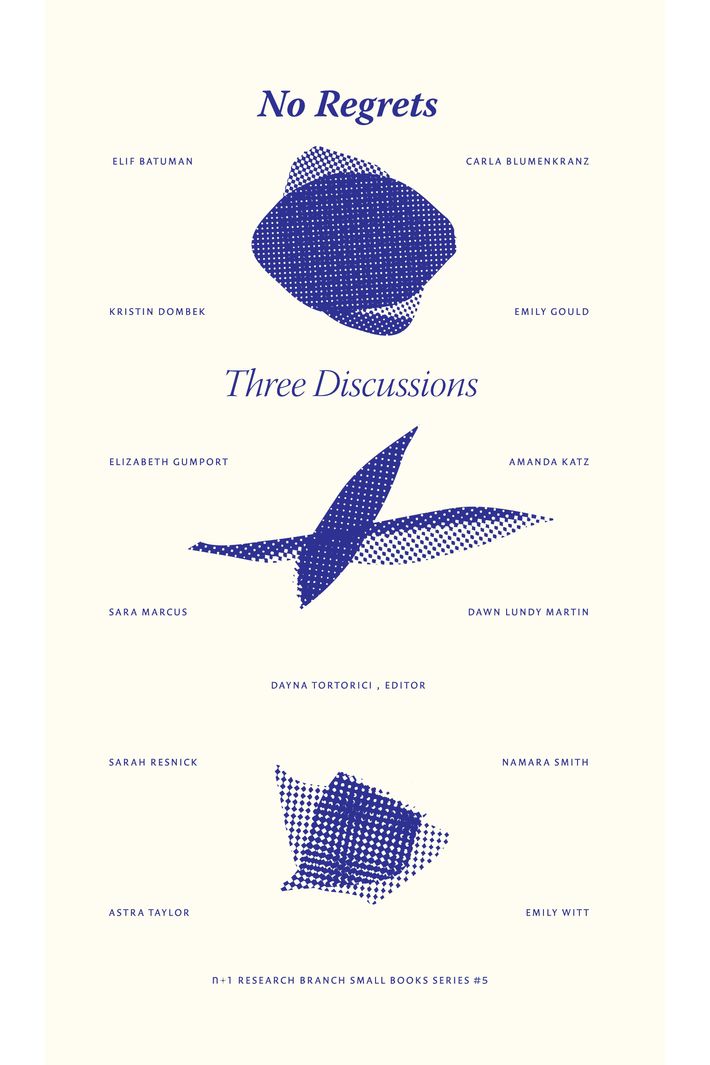
In 2007, the magazine n+1 published a collection of conversations among writers and editors about the books they’d read and wished they’d read in their college years. The conversations involved a lot of regret: about things they’d missed out on, or misunderstood, or mistakenly believed to be good, or just generally screwed up. This year, they decided to repeat the project — but with only women. The book that resulted is called No Regrets. It’s out next week, and available for pre-order now.
“Women speak to one another differently in rooms without men,” writes the book’s editor, Dayna Tortorici, in her introduction. “Not better, not more honestly, not more or less intelligently — just differently, and in a way one doesn’t see portrayed as often as one might like.” The result is “a book of women talking about the processes of becoming themselves.”
The following excerpt comes from a conversation between Tortorici and the writers Carla Blumenkranz, Emily Gould, and Emily Witt, recorded on July 21, 2013.
Dayna Tortorici: Did anything particular open up a new world of books or ideas for you?
Emily Gould: The book that did it for me was I Love Dick. I didn’t read it until 2009, and it absolutely changed my life. For many reasons that is the book that changed my life, not in terms of being a writer in any way, but in terms of being a human being and living my life as a mostly heterosexual woman. It explained the problem of heterosexuality to me in terms that I had never thought about before. I had been attracted to books by and about gay people or at least people with fluid sexuality for a long time, and had not spent much time thinking about why that was. Worlds without straight men appealed to me; I liked the idea that there could be narratives that didn’t operate on the presumption of women’s dependence on men for love, money, and support. I Love Dick was the first work of fiction I’d ever read that acknowledged that women who were attracted to men and wanted to have relationships with them were not going to somehow create relationships that existed outside of all existing economic and social structures; that women who love men are going to have to come to terms with their complicity in their own repression and subjugation, and find ways to address it. This is not all the book’s about, of course, but that was my first and most lasting takeaway.
But the second thing was, weirdly, around the same time, in my late twenties, I read Philip Roth for the first time. Philip Roth, whom I’d always avoided — along with all the other midcentury misogynists — because I was like, “Nope, can’t do it, can’t go there. It’s bad and un-PC and I won’t find anything there that I can stomach. I’ll just be so offended and I won’t be able to read these books. There are plenty of people enjoying them and I refuse to be one of them.”
But it turns out that I love those books. They have that same quality of being unrepentant. And the idea that you can write a novel that very clearly, unabashedly, unrepentantly has autobiographical elements, a novel that says, “What, fuck you, who even cares? This is what a novel is, and you can like it or you can get off the bus” — I appreciated that.
Carla Blumenkranz: His later books are so craft-driven that I don’t have a block with them. I think The Human Stain is amazing, I think The Counterlife is amazing, in a way that doesn’t feel particularly different from anything else to me. But his early books — I’m just the worst reader of them. They’re the only books where my gender and social life had felt involved in my capacity to read them.
Gould: Those are the ones that I’m really into.
Blumenkranz: The first Roth book I ever read, and one of the very few books I ever read, where I thought, “I don’t understand this. It’s because I’m a woman. I’m so angry,” was Portnoy’s Complaint. I was 18 or 19.
I didn’t read him again until after the first serious relationship I had, which wasn’t until just after college. My boyfriend was like, “You know, everything that we’ve been doing together actually is the plot of ‘Goodbye Columbus.’ You have no idea how much this is just like it.” I didn’t read it until, inevitably, we broke up two years later, and it was true! I had been such a Brenda. And I’m still a really bad reader of that book.
Emily Witt: When you say you’re a bad reader, you mean you don’t like it?
Blumenkranz: Well, I actually love “Goodbye Columbus,” because it turned out that this person I was forcing to go running and eat fruit with me and all of these things was actually replicated in this novella.
Witt: You saw your own . . .
Blumenkranz: It was gross. It was horrible.

Witt: I get kind of irritated or prickly when people say men who write are just creating a fantasy woman, because in fact a male writer can reveal a woman to you in a way that you wouldn’t see it. And vice versa. Also, I hate — how do I put this? — the idea that only if a woman is writing with really physical language or using a certain angry tone that she achieves a true female voice, versus . . .
Tortorici: Do people say that?
Witt: I feel like that’s what Emily was just suggesting, kind of. You were referring to commercial women’s fiction and being confessional, and I got the sense that you thought it was pretty insipid. And that, you know, I Love Dick was a revelation because Chris Kraus was strident.
Gould: I don’t think that particular distinction was about style.
Witt: Well, I think we all reach a point in our reading where you start having sex and having relationships, and you need to read about it, because that’s how you’ve always understood the world as a person who reads. And I hit a wall — for some reason it was hard to find a book that explained what was going on with me in the way that books previously could reflect my reality and help me understand it. The Bell Jar was a really important book, and I read that because somebody told me, “This is like The Catcher in the Rye for women, from a female perspective.” And that was true, for me. That book clarified some of my own thoughts and experiences. But after I read The Bell Jar I had trouble finding another bildungsroman by a woman that really resonated with me. I’m not saying they don’t exist, but many of the great classic coming-of-age novels about the female experience don’t openly discuss sex.
I read the ones by men instead, until I was like, “I cannot read another passage about masturbation. I can’t.” It was like a pile of Kleenex. I read Portnoy’s Complaint. I read Jonathan Lethem’s Fortress of Solitude, when it came out. I read, I don’t even remember — but I read like five male coming-of-age novels that had intense, long passages about masturbation. These books taught me a lot about what it must be like to be a young man, and gave me some terrible ideas about the kind of woman I didn’t want to be, in order to not be thought dull or needy by the intelligent, masturbating young men I liked, but they did not help me understand my life. Except for The Bell Jar I didn’t have a book that gave me an archetype, of a young, educated, sexually curious, neurotic but adventurous heterosexual female who was not trying to overcome sexual trauma. I was looking for something at the midpoint between Anna Karenina and Bridget Jones’s Diary and there was just a void. Now I would put Doris Lessing’s The Golden Notebook in there, and Zadie Smith’s NW.
Gould: Go back to the thing you were saying earlier, about how you get upset when people say male novelists aren’t able to portray women.
Witt: Well, the pernicious thing about reading Roth when you’re a young person is that you think, “I don’t want to be that girlfriend. I don’t want to act like that.” Because the men around me were speaking that language when I read those books, that was how I reacted. I thought, “This is a world that I have to conform to.” And I still haven’t resolved whether that’s true or not. It may be true.
Blumenkranz: You mean a world where everyone reads Roth, or a world in which sexual dynamics are as they are portrayed there?
Witt: The sexual dynamics. In college, you’re reading, but you’re also having really intense personal experiences, right? You’re really having sex for the first time, really dating for the first time, and you’re looking for things to help you understand it. You find out that people you actually know go to prostitutes and cheat on each other. Stuff that in these novels is adulthood. These were the books that were handed to me, and so I thought, “This is something that I have to get used to.” I knew that if I had been a young man, I would mimic these novels too. The realization that there were parts of that acting out that I didn’t get to do, solely because of my gender, and other parts in which my acting out was seen differently, not as fun but desperate, was devastating. I can’t even explain how devastating that was. I couldn’t even think of the ethics of any of it because all I saw was the role I was confined to in those stories. I can’t think of a book that I would’ve given myself that would’ve armed me against that feeling. I got really mad at the books. I remember getting mad at a boyfriend who had lied and saying, “YOU THINK YOU’RE THE HERO OF A FUCKING UPDIKE NOVEL.” But it was my role I resented, the role of the bovine female, while he was the Julien Sorel, the deceptive, neurotic, charmingly flawed hero balancing competing claims for his affection — again, the bearer of narrative.
Tortorici: Can’t rejecting a certain kind of novel be a way of rejecting a certain kind of reality? I think that’s why I never wanted to read Roth. My feeling was, “I don’t want to live in a world in which this mirrors reality.”
Witt: But when a Roth-like situation is really happening to you . . .
Tortorici: … then it’s important to read Roth?
Witt: It is. And that’s why reading Foucault was super important to me in college. The History of Sexuality talks a lot about confession and the power bestowed upon the person who receives the confession. The reason that Roth felt like something that I had to conform to was that I couldn’t go to a prostitute. There was nothing that I could do that would make a man feel the way that I had been made to feel. This was a fact of being alive I had to conform to. When I read Foucault, he explained the dynamic: that being able to know a world, and bear its secrets, is a kind of power over somebody. And forbidding access to that kind of knowledge — of being able to look at somebody sexually in that way, or to purchase a sexual body, even just going to a strip club — there’s a power that exists there. There wasn’t a novel that I could’ve read that would’ve helped me. Or maybe there is one. I don’t know.




